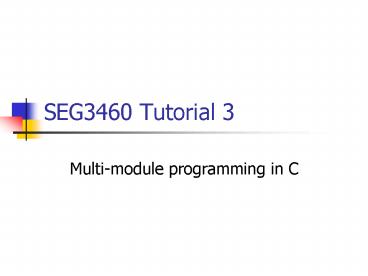SEG3460 Tutorial 3 - PowerPoint PPT Presentation
1 / 11
Title:
SEG3460 Tutorial 3
Description:
... says that if you type make all it will make all the object files and executables ... clean, it will remove all of the executables. See an example makefile ... – PowerPoint PPT presentation
Number of Views:58
Avg rating:3.0/5.0
Title: SEG3460 Tutorial 3
1
SEG3460 Tutorial 3
- Multi-module programming in C
2
From Source Code to ExecutablePreprocessing,
Compiling and Linking
- Preprocessing handles all directives
- E.g.
- Header file inclusion (include)
- Defining constant variables or functions
(define) - The above examples are basically copy-and-paste
operations - Compiling
- Convert the source code of each module into
object files (.o) - Under Unix gt gcc c module1.c An object file
module1.o would then be created - Linking
- Link all the modules and required libraries
together to create an executable - Under Unixgt gcc -o a.out module1.o module2.o
3
Header FilesFunction Prototype
- Function prototype tell the compiler what types
of arguments would an unknown function take and
what types of value it returns - For example, look at retstring.cinclude
"retstring.h" char return_string(int i, double
d) char string string (char )
malloc(80) sprintf(string, "d .2lf", i,
d) return string - Then, what should be wrote in retstring.h, such
that other modules that use this function can
compile successfully? - Only need to write the function prototype char
return_string(int, double) - Why retstring.c included retstring.h?
4
Header FilesFunction Prototype (2)
- If we want to use return_string() in another C
file, we include retstring.h. For example, here
is a program called print12.c - Compile them and link themUNIXgt gcc -c
print12.c UNIXgt gcc -c retstring.c UNIXgt gcc -o
print12 print12.o retstring.o UNIXgt print12 1
2.33 - What if we didn't include retstring.h, like
print12a.c? - We would get a compiler warning UNIXgt gcc -c
print12a.c print12a.c In function main'
print12a.c7 warning assignment makes pointer
from integer without a cast - This warning comes because C implicitly assumes
that all functions return integers (and take
integer arguments) if you dont explicitly
declare them - A warning would not stop you to compile, but
indicate you probably doing something wrong!!
5
Header FilesUsing Standard Library
- C comes with a bunch of header files and
libraries that are standard - Suppose you want to use the log10 function in
standard math library - Type man log10 in console to see the usage
- First, look at a bad example badlog1.c, which use
log10 but doesnt include math.h - Compile itUNIXgt gcc -o badlog1 badlog1.c
Undefined first referenced
symbol in file
log10 /var/tmp/cca007Fp1.o
ld fatal Symbol referencing errors. No output
written to badlog1
6
Header FilesUsing Standard Library
- Add -lm as told in man-pageUNIXgt gcc -o
badlog1 badlog1.c -lm UNIXgt badlog1 0.000000 - Include math.h, see goodlog1.cUNIXgt gcc -o
goodlog1 goodlog1.c -lm UNIXgt goodlog1 4.477121
- Note that including standard library need angle
brackets
7
Header FilesShare variables across modules
- To define a global variable to use in multiple C
files - The way to do this is to define the variable in
one file, and then declare it as an extern
variable in another. - For example, look at share1.c and share2.c
- Compile and runUNIXgt gcc -c share1.c UNIXgt gcc
-c share2.c UNIXgt gcc -o share share1.o share2.o
UNIXgt share 45 - extern here is to distinguish declaration from
definition - What if we didn't define GV as a regular global
variable in share2.c? See share3.cUNIXgt gcc -c
share3.c UNIXgt gcc -o share share1.o share3.o
Undefined first
referenced symbol
in file GV
share1.o ld fatal Symbol
referencing errors. No output written to share
8
Header FilesShare variables across modules (2)
- If we define GV twice, then the compiler will
give us another error. - Here, share4.c is identical to share2.c UNIXgt
cp share2.c share4.c UNIXgt gcc -c share4.c
UNIXgt gcc -o share share1.o share2.o share4.o
ld fatal symbol GV' is multiply defined
(file share2.o and file share4.o) ld fatal
File processing errors. No output written to
share - Typically, it is recommended to put the extern
declarations into a header file, and then the
programs simply need to include the header file. - For exmaple, twoshare1.c and twoshare2.c share
the variables GV1 and GV2 through the header file
twoshare.h - Compile and runUNIXgt gcc -c twoshare1.c UNIXgt
gcc -c twoshare2.c UNIXgt gcc -o twoshare
twoshare1.o twoshare2.o UNIXgt twoshare 45 99
9
Header FilesShare data types across modules
- You can also define types in header files, and
then multiple C files can use the same type. - For example, typeshare1.c and typeshare2.c share
the definition of the type Person through the
header file typeshare.h - Compile and runUNIXgt gcc -c typeshare1.c UNIXgt
gcc -c typeshare2.c UNIXgt gcc -o typeshare
typeshare1.o typeshare2.o UNIXgt typeshare Jim
Plank
10
Make
- Make help you compile
- By default, it assumes that you have a file
called makefile or Makefile in the current
directory - To override this default setting, add f flag
- The makefile needs to be in specific format,
- E.g.hw hw.o gcc -o hw hw.o hw.o hw.c gcc
-c hw.c - The first line is the target (left) and its
dependencies. - In the example tells make that the exectable hw
is made from the object file hw.o. - The second line is the command to compile the
target. - In the example, it tells make to compile hw using
the command gcc -o hw hw.o
11
Make (2)
- Two special cases all and clean
- The all specification says that if you type make
all it will make all the object files and
executables - The clean specification says that if you type
make clean, it will remove all of the executables
- See an example makefile































